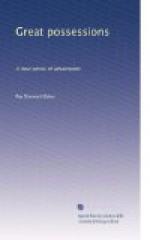It is well known that when one sense is defective the others fly to the rescue, and my father’s singular development of the sense of smell may have been due in part to this defect, though I believe it to have been, to a far larger degree, a native gift. Me had a downright good nose. All his life long he enjoyed with more than ordinary keenness the odour of flowers, and would often pick a sprig of wild rose and carry it along with him in his hand, sniffing at it from time to time, and he loved the lilac, as I do after him. To ill odours he was not less sensitive, and was impatient of rats in the barn, and could smell them, among other odours, the moment the door was opened. He always had a peculiar sensitiveness to the presence of animals, as of dogs, cats, muskrats, cattle, horses, and the like, and would speak of them long before he had seen them or could know that they were about.
I recall once on a wild Northern lake, when we were working along the shore in a boat, how he stopped suddenly and exclaimed:
“David, do you hear anything?”—for I, a boy, was ears for him in those wilderness places.
“No, Father. What is it?”
“Indians.”
And, sure enough, in a short time I heard the barking of their dogs and we came soon upon their camp, where, I remember, they were drying deer meat upon a frame of poplar poles over an open fire. He told me that the smoky smell of the Indians, tanned buckskin, parched wild rice, and the like, were odours that carried far and could not be mistaken.
My father had a big, hooked nose with long, narrow nostrils, I suppose that this has really nothing to do with the matter, although I have come, after these many years, to look with a curious interest upon people’s noses, since I know what a vehicle of delight they often are. My own nose is nothing to speak of, good enough as noses go—but I think I inherited from my father something of the power of enjoyment he had from that sense, though I can never hope to become the accomplished smeller he was.
I am moved to begin this chronicle because of my joy this morning early—a May morning!—just after sunrise, when the shadows lay long and blue to the west and the dew was still on the grass, and I walked in the pleasant spaces of my garden. It was so still...so still...that birds afar off could be heard singing, and once through the crystal air came the voice of a neighbour calling his cows. But the sounds and the silences, the fair sights of meadow and hill I soon put aside, for the lilacs were in bloom and the bush-honeysuckles and the strawberries. Though no movement of the air was perceptible, the lilacs well knew the way of the wind, for if I stood to the north of them the odour was less rich and free than to the south, and I thought I might pose as a prophet of wind and weather upon the basis of this easy magic, and predict that the breezes of the day would be from the north—as, indeed, they later appeared to be.




